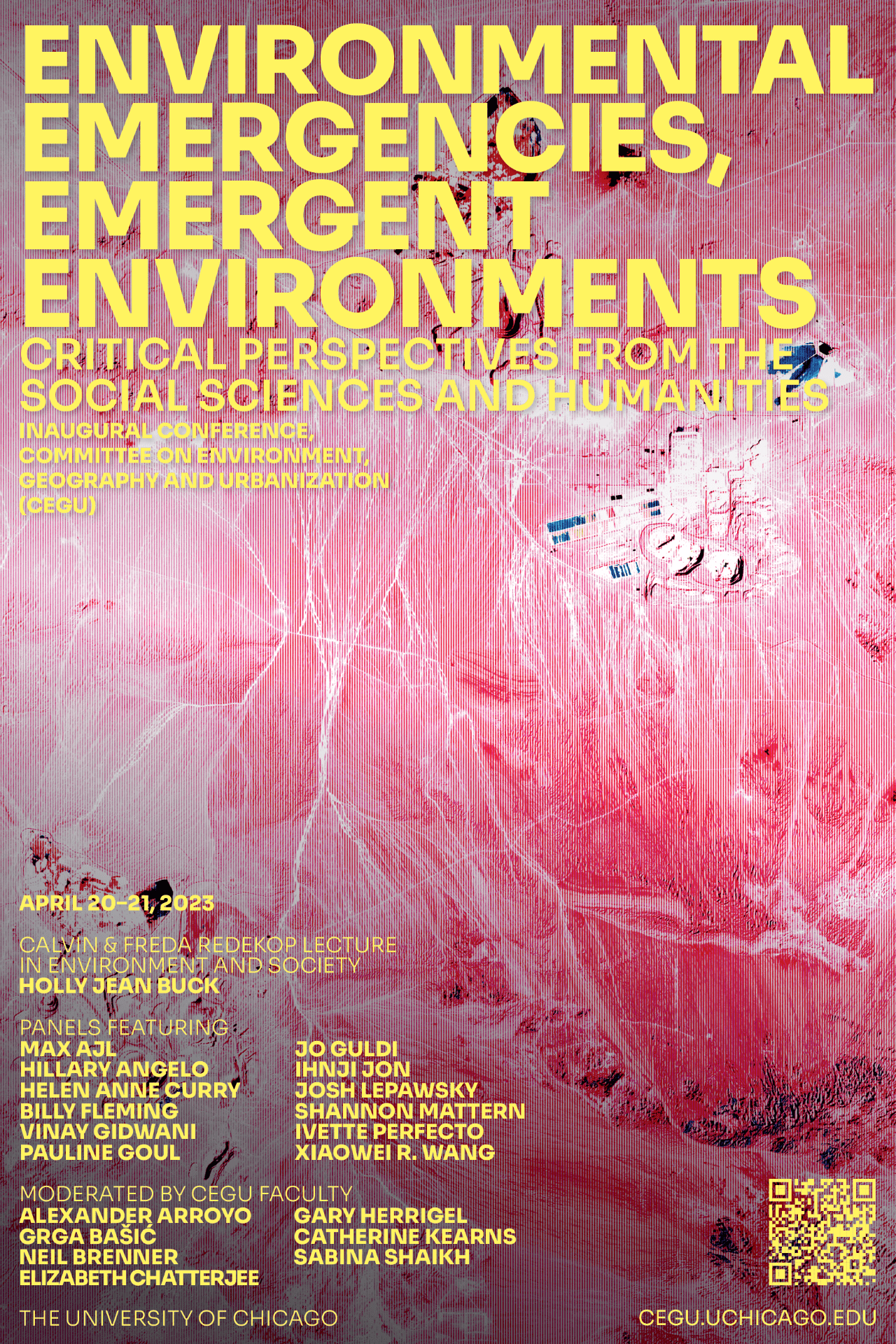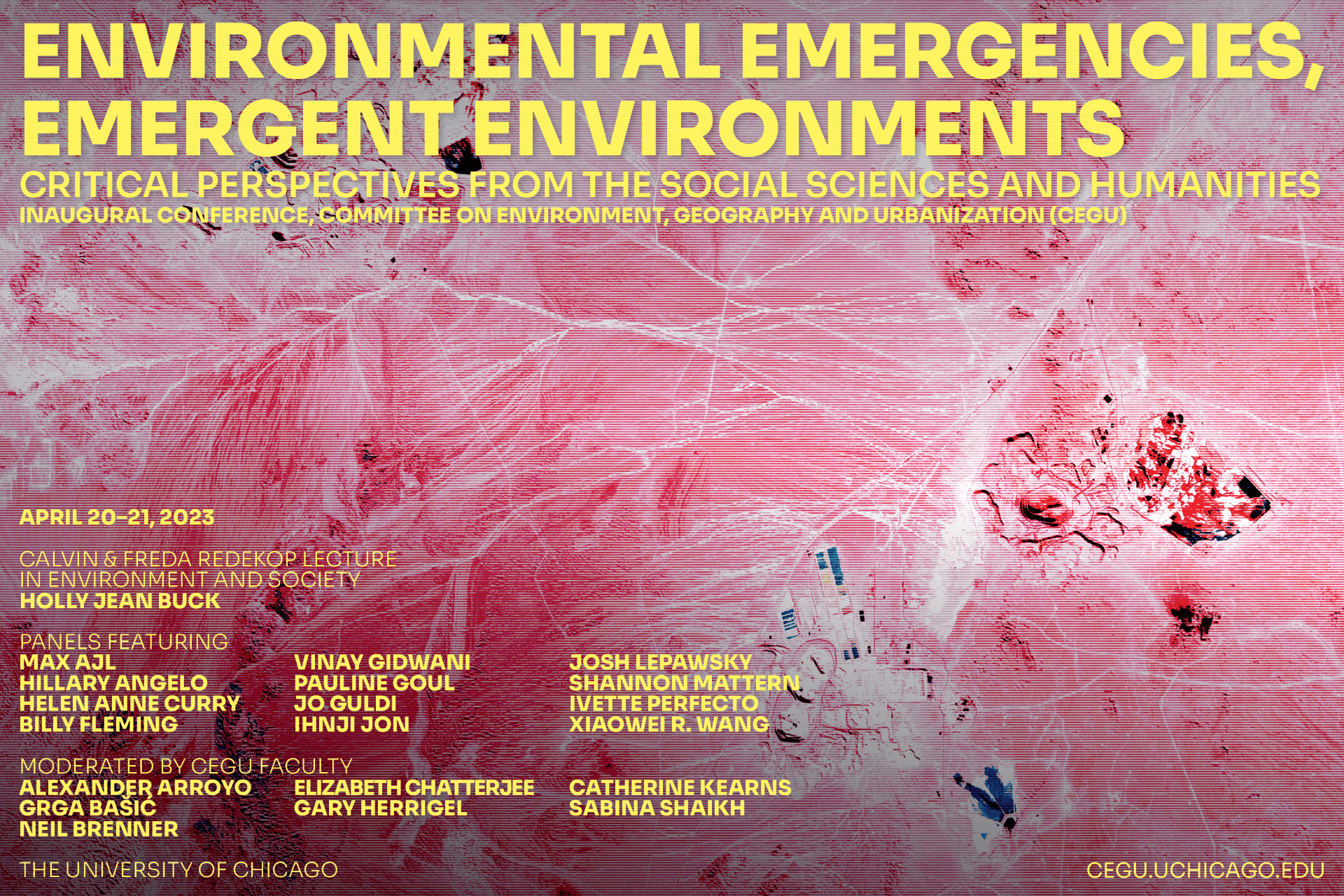Environmental Emergencies, Emergent Environments
Critical Perspectives from the Social Sciences and Humanities
Inaugural Conference, Committee on Environment, Geography and Urbanization (CEGU)
Division of Social Sciences, The University of Chicago
April 20–21, 2023
Environmental Emergencies,
Emergent Environments
Critical Perspectives from the Social Sciences and Humanities
Inaugural Conference, Committee on Environment, Geography and Urbanization (CEGU)
Division of Social Sciences, The University of Chicago
April 20–21, 2023
Speculative Geographies & Spatial Media
Moderated by Alexander Arroyo and Grga Bašić, University of Chicago
Friday, April 21, 2023, 10:45am–12:15pm
Room 122, Regenstein Library
The extraordinary proliferation of geospatial and environmental data of recent years is mirrored by the proliferation of speculative geographies and the forms of spatial media through which they come into view. These spatial media—the whole range of technologies and techniques for generating, processing, relating, and representing data—map out new spaces of possibility for radically different imaginaries of landscape histories and climate futures alike. How might experimental approaches to spatial media build critical research, aesthetic practices, and political projects to explore these speculative geographies? How might they engender new modes of mapping altogether?
Arboreal Intelligence
Shannon Mattern, University of Pennsylvania
Shannon Mattern↗ is the Penn Presidential Compact Professor of Media Studies and the History of Art at the University of Pennsylvania. From 2004 to 2022 she served in the Department of Anthropology and the School of Media Studies at The New School in New York City. Her writing and teaching focus on archives, libraries, and other media spaces; media infrastructures; and spatial epistemologies. She is the author of The New Downtown Library: Designing with Communities (University of Minnesota Press, 2006); Deep Mapping the Media City (University of Minnesota Press, 2015); Code and Clay, Data and Dirt: 5000 Years of Urban Media (University of Minnesota Press, 2017); and A City Is Not a Computer (Princeton University Press, 2021). She also contributes a regular long-form column about urban data and mediated infrastructures to Places Journal. In addition, she serves as president of the board of the Metropolitan New York Library Council and regularly collaborates on public design and interactive projects and exhibitions.
Towards the Impossible Image
Xiaowei R. Wang, UC Berkeley
Xiaowei R. Wang is an artist, writer, organizer and coder. They are the author of the book Blockchain Chicken Farm: And Other Stories of Tech In China's Countryside (Farrar, Straus and Giroux, 2020), a 2023 National Book Foundation Science and Literature Award winner. Their writing has appeared in TANK, transmediale, The Nation and more. Currently, they are one of the stewards of Logic School, an organizing community for tech workers, a research fellow at the Center on Race and Digital Justice and a Senior Civic Media Fellow at USC Annenberg. They are working on their second book on the design of tech for care, as well as a new body of work, Witch Fever, that is a speculative botany co-created with an AI.
Spatial Practices in an Age of Data: Three Projects in the Service of Democratic Ecology
Jo Guldi, Southern Methodist University
Jo Guldi, professor of history and practicing data scientist, is author of four books: Roads to Power: Britain Invents the Infrastructure State (Harvard University Press, 2012), The History Manifesto (Cambridge University Press, 2014), The Long Land War: The Global Struggle for Occupancy Rights (Yale University Press, 2022), and The Dangerous Art of Text Mining (Cambridge University Press, forthcoming). Her historical work ranges from archival studies in nation-building, state formation, and the use of technology by experts. She has also been a pioneer in the field of text mining for historical research, where statistical and machine-learning approaches are hybridized with historical modes of inquiry to produce new knowledge. Her publications on digital methods include “The Distinctiveness of Different Eras” (American Historical Review, August 2022) and “The Official Mind’s View of Empire, in Miniature: Quantifying World Geography in Hansard’s Parliamentary Debates” (Journal of World History, June 2021). She is a former junior fellow at the Harvard Society of Fellows.

